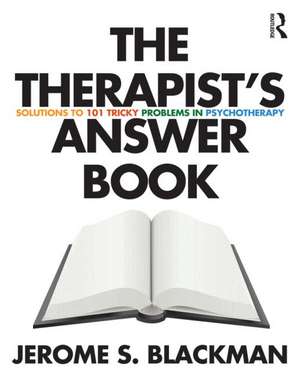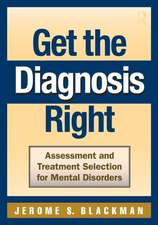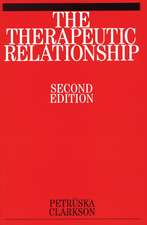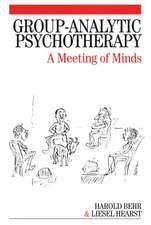The Therapist's Answer Book
Autor Jerome S. Blackmanen Limba Engleză Paperback – 25 oct 2012
Do depressed people need an antidepressant, or psychotherapy alone? How do you handle people who want to be your “friend,” who touch you, who won’t leave your office, or who break boundaries? How do you prevent people from quitting treatment prematurely? Suppose you don’t like the person who consults you? What if people you treat with CBT don’t do their homework? When do you explain defense mechanisms, and when do you use supportive approaches?
Award-winning professor, Jerome Blackman, answers these and many other tricky problems for psychotherapists. Dr. Blackman punctuates his lively text with tips and snippets of various theories that apply to psychotherapy. He shares his advice and illustrates his successes and failures in diagnosis, treatment, and supervision. He highlights fundamental, fascinating, and perplexing problems he has encountered over decades of practicing and supervising therapy.
| Toate formatele și edițiile | Preț | Express |
|---|---|---|
| Paperback (1) | 418.92 lei 6-8 săpt. | |
| Routledge – 25 oct 2012 | 418.92 lei 6-8 săpt. | |
| Hardback (1) | 913.37 lei 6-8 săpt. | |
| Taylor & Francis – 14 noi 2012 | 913.37 lei 6-8 săpt. |
Preț: 418.92 lei
Preț vechi: 440.97 lei
-5% Nou
Puncte Express: 628
Preț estimativ în valută:
80.17€ • 83.52$ • 66.66£
80.17€ • 83.52$ • 66.66£
Carte tipărită la comandă
Livrare economică 08-22 februarie 25
Preluare comenzi: 021 569.72.76
Specificații
ISBN-13: 9780415888929
ISBN-10: 0415888921
Pagini: 391
Ilustrații: 3 black & white illustrations, 2 black & white tables, 3 black & white line drawings
Dimensiuni: 188 x 246 x 20 mm
Greutate: 0.59 kg
Editura: Routledge
ISBN-10: 0415888921
Pagini: 391
Ilustrații: 3 black & white illustrations, 2 black & white tables, 3 black & white line drawings
Dimensiuni: 188 x 246 x 20 mm
Greutate: 0.59 kg
Editura: Routledge
Cuprins
Part I: A Very Quick Take on Assessment and Technique. Part II: General Principles about Treatment. Part III: Techniques with Different Types of Disturbances. Part IV: Techniques with Acting In and Acting Out. Part V: Your Reactions to People in Treatment. Part VI: Modification to the "Frame" of Treatment. Part VII: Special Issues.
Recenzii
“The Therapist's Answer Book is a must have for both the beginning and seasoned psychotherapist. Dr. Blackman solves problems that all therapists encounter in an erudite, useful, down-to-earth manner while being sophisticated, witty, and elegant at the same time. This book is a treasure.” - Jane S. Hall, LCSW, FIPA, Contemporary Freudian Society, APsaA
“With extraordinary clarity, Dr. Blackman masterfully integrates clinical theory, technique, and ethics to provide a richly comprehensive resource for addressing the daily concerns and problems inherent in psychotherapeutic treatment. The Therapist's Answer Book is a requisite addition to the psychotherapist's library.” - Janet N. Schiff, LCSW, FIPA (Fellow of the International Psychoanalytic Association)
“Drawing on four decades of clinical experience, Jerome Blackman gives tips on solving problems for which the psychotherapist is unprepared, ranging from a patient bringing a drink to a session, wishing for a hug, or asking about the therapist’s personal life. Concise descriptions of technical and theoretical reasons for direct, short answers make this book an excellent teaching tool.” - Vamık D. Volkan, MD, Emeritus Professor of Psychiatry, University of Virginia; author, Psychoanalytic Technique Expanded: A Textbook on Psychoanalytic Treatment
"Writing with his usual gift for clarity and unique ability to break down the complex aspects of the psychotherapeutic process, Jerome Blackman has written The Therapist's Answer Book, a book for the beginning and experienced clinician alike. What Blackman accomplishes is a book that weaves together theoretical models, creative approaches to assessing ego and superego functioning, and new ways of categorizing a range of behaviors and clinical dilemmas that confront us each day. Drawing upon years in his consulting room and his experience as a supervisor and teacher, Blackman uses clinical vignettes to illustrate the central issues involved in assessment, diagnosis, and technique. Blackman offers us both short and long answers to clinical questions. His short answers reflect years of thought and experience, and his long answers illustrate the clinical dilemma and narrative. His vignettes capture and answer the wide range of situations that we, as clinicians, question in our encounters with patients, from how to understand and address the patient who moves our furniture during a session to how to approach and understand patients we find asleep in our waiting room. As always, Blackman writes in an engaging, accessible way that clarifies the difficult situations that make up our work." - Meryl J. Botkin, Ph.D., San Francisco Center for Psychoanalysis; Assistant Clinical Professor in Psychiatry, University of California, San Francisco
“With extraordinary clarity, Dr. Blackman masterfully integrates clinical theory, technique, and ethics to provide a richly comprehensive resource for addressing the daily concerns and problems inherent in psychotherapeutic treatment. The Therapist's Answer Book is a requisite addition to the psychotherapist's library.” - Janet N. Schiff, LCSW, FIPA (Fellow of the International Psychoanalytic Association)
“Drawing on four decades of clinical experience, Jerome Blackman gives tips on solving problems for which the psychotherapist is unprepared, ranging from a patient bringing a drink to a session, wishing for a hug, or asking about the therapist’s personal life. Concise descriptions of technical and theoretical reasons for direct, short answers make this book an excellent teaching tool.” - Vamık D. Volkan, MD, Emeritus Professor of Psychiatry, University of Virginia; author, Psychoanalytic Technique Expanded: A Textbook on Psychoanalytic Treatment
"Writing with his usual gift for clarity and unique ability to break down the complex aspects of the psychotherapeutic process, Jerome Blackman has written The Therapist's Answer Book, a book for the beginning and experienced clinician alike. What Blackman accomplishes is a book that weaves together theoretical models, creative approaches to assessing ego and superego functioning, and new ways of categorizing a range of behaviors and clinical dilemmas that confront us each day. Drawing upon years in his consulting room and his experience as a supervisor and teacher, Blackman uses clinical vignettes to illustrate the central issues involved in assessment, diagnosis, and technique. Blackman offers us both short and long answers to clinical questions. His short answers reflect years of thought and experience, and his long answers illustrate the clinical dilemma and narrative. His vignettes capture and answer the wide range of situations that we, as clinicians, question in our encounters with patients, from how to understand and address the patient who moves our furniture during a session to how to approach and understand patients we find asleep in our waiting room. As always, Blackman writes in an engaging, accessible way that clarifies the difficult situations that make up our work." - Meryl J. Botkin, Ph.D., San Francisco Center for Psychoanalysis; Assistant Clinical Professor in Psychiatry, University of California, San Francisco
Notă biografică
Jerome S. Blackman, MD, is Professor of Clinical Psychiatry at Eastern Virginia Medical School. He has taught at Beijing University, Tulane School of Social Work, Virginia Wesleyan College, Old Dominion University, MIT Educational Studies Program, and Naval Medical CenterߝPortsmouth, and presented at programs in Germany, Italy, China, and the United States. His first book, 101 Defenses, has been translated into Chinese and Romanian.
Descriere
Descriere de la o altă ediție sau format:
Author Jerome Blackman confronts the universal, common, unusual, and rare problems that arise for practitioners during psychotherapeutic treatment.
Author Jerome Blackman confronts the universal, common, unusual, and rare problems that arise for practitioners during psychotherapeutic treatment.

























